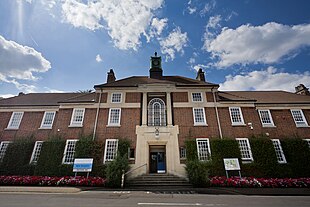Bethlem Royal Hospital
| Bethlem Psychiatric Hospital | |
|---|---|
|
King's Health Partners South London and Maudsley NHS Foundation Trust |
|

Bethlem Royal Hospital
|
|
| Geography | |
| Location | Bromley, London, Greater London, England |
| Organisation | |
| Care system | NHS |
| Hospital type | Specialist |
| Services | |
| Emergency department | Admissions through A&E |
| Beds | Approx 350 |
| Speciality | Psychiatric hospital |
| History | |
| Founded |
1247 as priory 1330 as hospital |
| Links | |
| Website | www |
| Lists | Hospitals in England |
Bethlem Royal Hospital, also known as St Mary Bethlehem, Bethlehem Hospital and , is a psychiatric hospital in London. Its infamous history has inspired several horror books, films and TV series, most notably Bedlam, a 1946 film with Boris Karloff. It has moved three times from its original location, and is Europe's first and oldest institution to specialise in mental illnesses.
The hospital is closely associated with King's College London and, in partnership with the Institute of Psychiatry, Psychology and Neuroscience, is a major centre for psychiatric research. It is part of the King's Health Partners academic health science centre and the NIHR Biomedical Research Centre for Mental Health.
Originally the hospital was near Bishopsgate just outside the walls of the City of London. It moved outside of Moorfields in the 17th century, then to St George's Fields in Southwark in the 19th century, before moving to its current location at Monks Orchard in West Wickham in 1930.
The word "", meaning uproar and confusion, is derived from the hospital's prior nickname. Although the hospital became a modern psychiatric facility, historically it was representative of the worst excesses of asylums in the era of lunacy reform.
The hospital was founded in 1247 as the Priory of the New Order of St Mary of Bethlem in the city of London during the reign of Henry III. It was established by the Bishop-elect of Bethlehem, the Italian Goffredo de Prefetti, following a donation of personal property by the London alderman and former sheriff, Simon fitzMary. The original location was in the parish of St Botolph, Bishopsgate's ward, just beyond London's wall and where the south-east corner of Liverpool Street Station now stands. Bethlem was not initially intended as a hospital, in the clinical sense, much less as a specialist institution for the insane, but as a centre for the collection of alms to support the Crusader Church and to link England to the Holy Land. De Prefetti's need to generate income for the Crusader Church and restore the financial fortunes of his see had been occasioned by two misfortunes: his bishopric had suffered significant losses following the destructive conquest of Bethlehem by the Khwarazmian Turks in 1244, and his immediate predecessor had further impoverished his cathedral chapter through the alienation of a considerable amount of its property. The priory, obedient to the Church of Bethlehem, would also house the poor and, if they visited, provide hospitality to the bishop, canons and brothers of Bethlehem. Thus, Bethlem became a hospital, in British English usage, "an institution supported by charity or taxes for the care of the needy". The subordination of the priory's religious order to the bishops of Bethlehem was further underlined in the foundational charter, which stipulated that the prior, canons and inmates were to wear a star upon their cloaks and capes to symbolise their obedience to the church of Bethlehem.
...
Wikipedia
